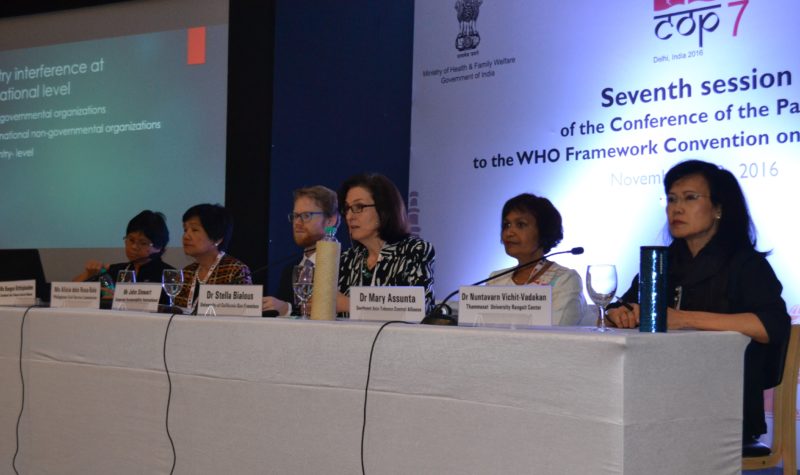Eighteen government delegates who represent the governments of more than 57 million people on Monday called for the strongest protections yet to guard against tobacco industry interference in public health policymaking. The appeal, released in an open letter on the opening day of the World Health Organisation’s Seventh Session of the Conference of the Parties (COP7) holding in New Delhi, India, sets the stage for a landmark decision to protect international policy from industries with conflicts of interest.

The call comes as delegates from up to 179 countries and the European Union convene in India to determine the next frontiers in tobacco control. It also builds on the support of more than 100 civil society organisations from India and around the globe for delegates to protect the negotiations from industry interference.
At the negotiations, formally known as the seventh session of the Conference of the Parties to the Framework Convention on Tobacco Control (FCTC), governments are poised to advance life-saving tobacco control measures such as plain packaging and graphic health warnings. However, to date, the tobacco industry has exploited loopholes in order to infiltrate treaty meetings and block, weaken and delay outcomes that could save millions of lives. In fact, the FCTC Global Progress report has stated that the “tobacco industry continues to be the most important barrier in implementation of the Convention.”
“The tobacco industry is, hands-down, the single-largest threat to public health in the world,” said Dr. Sheila Ndyanabangi, Principal Medical Officer, Mental Health and Substance Abuse Control/ Tobacco Control, for the Ugandan Ministry of Health. “As delegates to the global tobacco treaty, we have an ethical responsibility to prioritise people’s health over the industry’s interests. Today, we recognise that the most urgent task before us is to protect policymaking from the corrosive influence of Big Tobacco.”
The global tobacco treaty contains a provision that protects policymaking processes from the tobacco industry at the international and national levels. The provision was created to address the tobacco industry’s strategies to upend regulations by influencing international and national policymaking bodies, as outlined by millions of internal documents. Despite this legal requirement, however, the tobacco industry has infiltrated negotiations through bribery, securing seats on government delegations, and posing as members of the public.
As the BBC exposed in November 2015, in spite of the treaty’s provision, British American Tobacco paid an official at the Burundi Ministry of Health and an FCTC representative to “support” the corporation’s interests in international negotiations about tobacco regulations. Tobacco industry interference has been so egregious that delegates have been forced to eject industry representatives from the last two international treaty negotiations.
“With recent wins against Big Tobacco’s legal bullying in Uruguay and Australia, we stand at a tipping point for public health,” said John Stewart, deputy director with Corporate Accountability International, an accredited observer to the global tobacco treaty proceedings. “Given the industry’s widespread lying, cheating, and outright bribery, governments are ready to act. The global tobacco control community is poised to protect decisions about people’s health from narrow corporate interests, and pave the way for a future where Big Tobacco and its bullying are a thing of the past.”
Akinbode Oluwafemi, deputy executive director of Environmental Rights Action/Friends of the Earth Nigeria (ERA/FoEN), said: “The time is now to put a final roadblock to Big Tobacco interference in public health policy. We have witnessed meddling in Nigeria; we have witnessed it across Africa and observed it at the global treaty meetings. Article 5.3 of the FCTC has proven to be the single most effective provision of the global treaty to block Big Tobacco interference.”
To date, dozens of governments have begun to implement measures in line with Article 5.3 at the national level, and more are expected to follow suit. For instance, Norway has divested more than $2 billion from the tobacco industry. Brazil adopted ethical guidelines for representatives of its tobacco control commission, CONICQ, requiring that it has no ties with the tobacco industry. The European Union has terminated its agreement with Philip Morris International. And the Philippines has restricted public officials from interacting with the tobacco industry to curb its influence.
In addition to Monday’s call to prevent industry meddling in public health, delegates also indicated plans to advance tools to hold the tobacco industry liable. The advances stem from a broader treaty directive called Article 19 that encourages governments to, among other recommendations, utilise legal systems to recoup the enormous costs of tobacco-related healthcare coverage.
The global tobacco treaty entered into force in 2005. To date, 179 countries and the European Union have become Parties to the treaty. It is said to contain the world’s most effective tobacco control and corporate accountability measures – estimated to save more than 200 million lives by 2050 if fully implemented.
